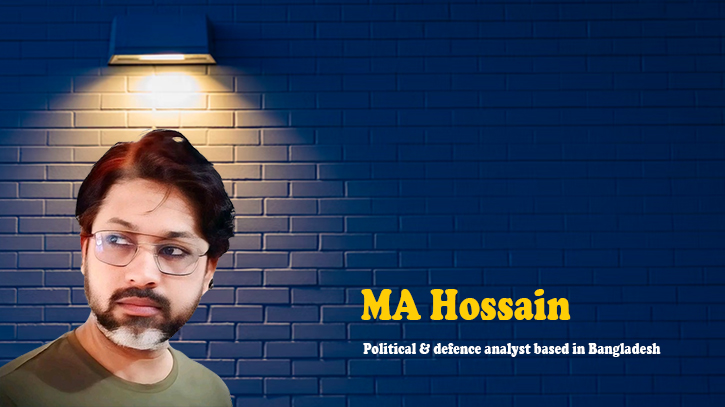
Photo : Messenger
The so-called mainstream media may continue to remain silent or parrot the propaganda of Iranian-backed Hamas centered on the October 7 raid. While in reality, it is a well-established fact that terror-patron Iran was behind the ‘Operation Al-Aqsa Flood’ where Hamas and other Palestinian Jihadist groups, including Palestinian Islamic Jihad (PIJ) and civilians in Gaza participated. It is also a proven fact that for years the ruler of Qatar, a Sunni nation, has provided hundreds of millions of dollars towards empowering Hamas, while Qatari Emir Sheikh Tamim bin Hamad Al Thani has been playing the role of the key patron of Hamas and even granting shelter to kingpins of this Jihadist outfit in Doha. By harbouring Hamas kingpins, Al Thani might have thought – he had become the godfather of the Middle East. But he was grossly wrong. Al Thani did not realise, with his cash, he was empowering a monster that is loyal to Iran—a Shiite nation that would cause harm to any of the Sunni nations in the region, including Saudi Arabia, Bahrain, Kuwait, Oman, the United Arab Emirates and also Qatar.
Iran’s recent missile attack in Pakistan’s Balochistan province, although protected by Tehran’s actions against the terrorist base, in reality has a different angle. Iranian Supreme Leader Ayatollah Ali Khamenei and his cronies consider Sunni Muslims as blood enemies, while they do not even consider Sunnis as Muslims. Tehran has a broad-based blueprint of ultimately waging war against each and every Sunni nation. Pakistan is just one of Tehran’s vicious targets. As the Israel-Hamas conflict turns into a catastrophe for Gaza residents, just three months after October 7, Iran has revealed its intention of beginning a Sunni-Shia war across the Middle East and beyond.
Initially, Iranian proxy Shia forces targeted various Western establishments. However, on January 16, Tehran launched air attacks on Pakistan while Iraq, the United Arab Emirates, Bahrain, and Saudi Arabia are in a row. The attacks appear premeditated, provoking warfare by Shiite Iran. The unfolding battle scenario suggests the West, particularly the Biden administration, is orchestrating a Shia-Sunni conflict in the Middle East. In a few weeks, the cloud may clear, revealing another bloody conflict between Shia and Sunni nations.
Political pundits predict that Asia will be a pivotal player in shaping the new world order. With 60 percent of the world’s population, Asia, particularly the Middle East, boasts the richest reserves of explored mineral resources. While the Western economy faces challenges, the Asian economy is collectively emerging as an economic superpower. Militarily, Asia surpasses other continents, including those with nuclear capabilities. In this context, the West is strategically redirecting its political manoeuvres from Africa to Asia. The Pentagon is known for its controversial policy of leveraging conflicts between Muslims. Asia is emerging as a game changer for the reorientation of the new world order.
The Iran-Pakistan conflict should not be underestimated. It would not be surprising if escalation extended to neighbouring regions and the Middle East. The timing of Iran’s diversified attacks is very crucial. Shia militias backed by Iran began saber-rattling when Hamas launched its offensive. Recent Houthi attacks in Yemen have alarmed Western nations due to Yemen’s crucial geostrategic significance on sea trade routes. Recently, the US has taken punitive measures against the Houthi rebels. The question may arise why not earlier? especially when they were previously fighting against the Saudi-led coalition forces. Now, Iran seems compelled to expand the conflict, possibly as a diversion from the Houthi situation.
The EU and other Western nations, excluding the USA, are reluctant to engage in another war. The US, particularly its defence industrial complex, sees an opportunity to sell arms to wealthy Muslim nations through this war. President Biden’s political image in the US is under scrutiny when the Republican Party appears stronger in the upcoming presidential election. Additionally, the US economy is grappling with the impact of the COVID-19 pandemic. A global war could serve as an economic uplift for the USA. If Asia becomes embroiled in conflict, the USA may gain unparalleled economic advantages over its rivals.
On the other hand, Iran has historically found leverage within the American Democratic Party. During Obama’s era, when Biden served as Vice President, Iran’s military influence significantly increased. Exploiting the Palestinian issue, Iran aimed to position itself as the most influential nation in the Middle East and a leader in the Muslim world. Recognising a contrast between the US and its traditional allies, Iran seized the opportunity. If Iran can establish itself as a strong defender of Muslim interests, it may lead Muslim nations from the forefront. Sensitivity towards the holiest places, including Al-Aqsa, unites Muslims. In this context, Iran and the USA find a convergence of their respective interests.
The West appears to be pushing Muslims into a Shia-Sunni conflict, with Iran targeting Sunni-majority states and nations closely allied with the USA. Iran’s strategy involves attacking Western allies to showcase its military strength. However, this tactic would help President Biden to secure approval for military supplies to affected nations, and espionage agencies could exploit opportunities for instigation. Pakistan remains unconvinced that a brotherly nation like Iran would launch an attack against them.
Iran aspires to play a decisive political role in the Middle East, but the Islamic schism makes it a challenging task. To garner Muslim sympathy, Iran utilises the Al-Aqsa issue as a political stunt. The West seems to be politically manipulating Shia, pushing for a biased Shia-Sunni conflict. There’s a belief that this conflict could potentially spread across the Middle East, shaping a textbook Shia-Sunni conflict.
The writer is a political and defence analyst based in Bangladesh.
Messenger/Fardin








